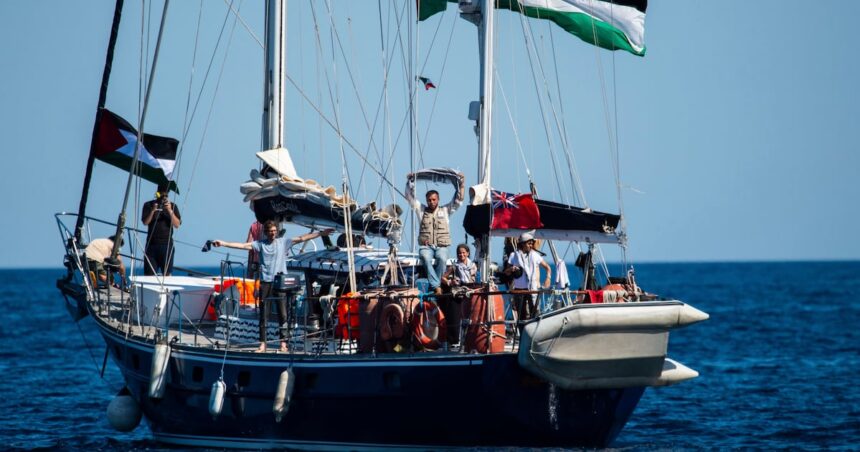Article – I’ve just received word that Israeli naval forces have intercepted a humanitarian vessel attempting to deliver medical supplies to Gaza – with climate activist Greta Thunberg among those on board. The diversion marks another flashpoint in the increasingly contentious struggle to deliver aid to Gaza’s desperate civilian population.
The vessel, part of a small flotilla organized by the Freedom Flotilla Coalition, was reportedly carrying several tons of medical supplies when it was intercepted in Mediterranean waters. According to the coalition’s spokesperson, whom I spoke with via satellite phone before communications were cut, “Our mission was entirely humanitarian in nature, aiming to deliver critical supplies to hospitals overwhelmed by casualties.”
Israeli authorities maintain the naval blockade is necessary for security purposes, with military officials stating the vessel was directed to the Israeli port of Ashdod for inspection. “All humanitarian aid intended for Gaza civilian population can enter through the designated land crossings after proper security inspection,” an IDF maritime operations commander told me during a brief call.
This interception happens against the backdrop of what UN officials have described as “catastrophic” humanitarian conditions in Gaza. Last month, World Food Programme representatives documented that over 90% of Gaza’s 2.2 million residents face severe food insecurity. The situation in hospitals remains equally dire, with the WHO reporting critical shortages of anesthetics, antibiotics, and basic surgical supplies.
Thunberg’s presence on the vessel represents her expanding activism beyond climate issues. “The humanitarian crisis in Gaza cannot be separated from broader questions of justice,” Thunberg stated in a video message released before the journey began. “When systems of oppression interconnect, so must our resistance.”
For Palestinians watching from Gaza, the symbolic gesture carries mixed meaning. “We appreciate international solidarity, but what we truly need is sustained pressure on Israel to allow unrestricted humanitarian access,” explained Dr. Maryam Khalidi, a physician at Al-Shifa Hospital, during our last conversation before communication lines deteriorated three days ago.
The maritime attempt to break the blockade carries historical echoes. In 2010, Israeli forces raided the Mavi Marmara, part of another Gaza-bound flotilla, resulting in the deaths of ten activists and sparking international condemnation. Today’s interception, while reportedly without casualties, underscores the unchanged dynamics surrounding Gaza’s isolation.
International aid organizations continue expressing frustration at the severe constraints on delivering assistance. “The trickle of aid currently permitted is wholly insufficient given the scale of need,” Médecins Sans Frontières‘ regional director told me during a briefing in Brussels last week. Their data shows that only about 17% of needed medical supplies have been permitted entry since October.
For the Biden administration, the incident creates fresh diplomatic complications amid efforts to negotiate a ceasefire. State Department officials have reiterated support for Israel’s security concerns while emphasizing the “urgent need to expand humanitarian access to Gaza.” This balancing act has increasingly strained America’s relationships with Arab partners who demand stronger pressure on Israel.
Egypt’s role remains pivotal, as the Rafah crossing represents a crucial entry point for aid. During my visit to Cairo last month, Egyptian officials expressed mounting frustration. “We have trucks backed up for kilometers, loaded with supplies that could save lives, yet the approval process remains opaque and inconsistent,” a senior border authority official confided.
The European Union’s foreign policy chief Josep Borrell has called for “immediate release of the vessel and all passengers,” while emphasizing that “humanitarian aid must reach those in desperate need through all possible channels.”
As night falls over the Mediterranean, the fate of the activists and their cargo remains uncertain. What is clear, however, is that this maritime confrontation represents more than a single blocked shipment. It embodies the larger struggle over Gaza’s isolation, the limits of humanitarian intervention, and the desperate needs of civilians caught in a conflict with no end in sight.
For the people of Gaza, watching another attempt at aid delivery falter only deepens their sense of abandonment. As one fisherman told me during my last reporting trip to the region: “The sea once represented our connection to the world. Now it reminds us of our imprisonment.”






